- Home
- Jason Webster
A Death in Valencia Page 3
A Death in Valencia Read online
Page 3
‘Which is when he called us.’
‘Right. The other employee there was Victoria Luna Pérez, a waitress, twenty-six. The Saturday was her last day at La Mar. According to what we’ve got, she went back to her flat, then caught the train the following morning to Zaragoza, before moving on to Logroño to stay with her family. Had been at La Mar for two months, but left because she couldn’t stand the atmosphere there, according to the statement she gave to the La Rioja police. Del Pozo confirmed there had been tensions between her and Roures, but claimed it was just because of the intensity of the work, and Roures’s attention to detail. Weak motive for an attack on her boss, although we’re waiting for the Logroño científicos to analyse her clothes for any signs of Roures’s blood.’
Cámara stared down at the coffee swirling around in his cup, part of his mind trying to decide if he wanted a brandy this early in the morning to wash it down with.
‘Fine,’ he said. ‘So much for that. Let’s concentrate on Roures himself.’
‘Fifty years old, well-known owner of an El Cabanyal paella and fish restaurant,’ Torres said. ‘Opened La Mar twenty-five years ago. Small, highly respected, award-winning place, popular with artists and musicians and El Cabanyal locals.’
‘And certain, more discerning policemen.’
‘I didn’t know you’d eaten there.’
‘A few times.’
‘As good as they say?’
Cámara nodded. ‘And I’m not just speaking from nostalgia. There was something about those paellas.’
‘Speaking as a native of Albacete, or a long-term resident of Valencia?’
‘All right, you bastard. I may not have paella running through my veins like you, but I know a good one when I taste one.’
‘It takes a true Valencian to tell.’
‘Bollocks. Come on, let’s keep going. Roures set La Mar up with his ex-wife, right?’
‘Lucía Bautista Sánchez. From El Cabanyal, like Roures. Divorced thirteen years ago. Still lives in the area. I spoke to her a couple of days ago: good alibi–she was out all night at a friend’s birthday party at a house in the mountains–and no obvious motive if you think they’ve been apart for so long.’
Cámara shrugged.
‘Since the split there’s been no sign of any other woman in Roures’s life,’ Torres said. ‘Appears to have dedicated himself entirely to the restaurant.’
‘Long, unsociable hours. Bloody hard work.’
‘Yeah,’ Torres hissed. ‘Sounds familiar.’
‘Anyone else in the ex-wife’s life?’
Torres sucked his teeth.
‘Don’t know. I’ll check.’
‘Don’t worry about it. I’ll look into it.’
‘Then there’s this fishing business. It seems everyone knew that Roures used to put out some palangre fishing lines after dusk each evening, then pulled them in before dawn from his little rubber dinghy. It’s illegal. Normally if a proper fisherman catches you doing that they tear up your lines. But he’d been doing it so long everyone turned a blind eye. God knows how he managed to keep the Guardia Civil patrols off his back.’
‘They’ve got problems of their own, I hear,’ Cámara said. ‘Understaffed. OK, the dinghy.’
‘Used to keep it in one of the abandoned boatyards next to the restaurant. Found floating near the industrial port two days later. With human bloodstains still on it.’
‘Roures’s?’
‘Huerta refuses to say. The samples are too degraded, what with the heat and humidity from the sea.’
Their colleague from the Policía Científica, Chief Inspector Huerta, had done the tests himself. He was extremely proud of his record for getting things right, which meant there was no room for ‘possibles’ or ‘probables’.
Cámara placed his fingertips together as he thought it through.
‘So the fresh fish he’s pulling up each morning he then offers to a select group of trusted clients. As well as putting some of it in his rice dishes, I suppose. I’m beginning to think this was the closest thing he had to a proper social life–a bit of a chat with some of the regulars, and then into the kitchen again.’
He thought back to the times he’d eaten there himself. It had been something of a habit of his to take girls to the restaurant, years before, when the city was still relatively new to him. Inviting them to La Mar had been a kind of private ritual: if they were still seeing each other after twenty-one days, he celebrated the event with paella in El Cabanyal. It acted as a sort of signal to himself that things were moving from a brief fling to something else, shifting into more dangerous terrain. None of the women had ever known the truth behind the pleasant rice-lunch; some had been enchanted by the place, others couldn’t quite understand the charm. These ones hadn’t lasted much longer: if someone focused more on the slighty grimy surroundings than on the authenticity of the place, they weren’t worth hanging on to. Almudena had liked it, and he hadn’t expected her to, which was perhaps one of the reasons why they had stayed together for over two years.
Then there was Alicia…He’d never even got the chance to bring her.
‘Yes,’ he said, his mind turning back to their conversation. ‘That would fit. I didn’t go often enough to be a regular there, but he was chatty. It certainly appeared that he enjoyed playing the host.’
Torres glanced down at his notes again.
‘That’s pretty much it. Other restaurateurs in the area respected him, but none of them seems to have known him that well.’
‘They’re all too busy. What about this local pressure group that’s challenging the Town Hall over the development plan?’
‘El Cabanyal, Sí. Roures used to go to their meetings. Active member, by all accounts. Provided free food once for a fund-raising event. Not surprising when you think his place was lined up for demolition.’
‘People have been talking about this redevelopment project for years.’
‘El Cabanyal, Sí have been fighting it in the courts since the late nineties. But they’ve just lost an appeal with the Valencian High Tribunal, and the bulldozers have already started work in some places. And now there’s a new councillor in charge of pushing the plan through. Rafael Mezquita–youngish, good-looking guy. Very churchy. They reckon he might take over from the mayoress one day.’
‘Any compensation for the people having their houses pulled down?’
‘The Town Hall’s been buying up affected properties and then leaving them empty. That’s why the area’s gone downhill so much. People who are holding out just get offered a token amount.’
‘How much?’
‘According to El Cabanyal, Sí, Roures would have got just over twenty thousand euro.’
‘They take your house and livelihood and in return you get veinte mil?’
‘And a new place to live. A flat somewhere. A low rent until you die, and then it reverts to the Town Hall.’
‘So nothing for your children? The family property is just lost?’
‘Yes. Although in Roures’s case that wouldn’t have been such a problem. No kids.’
‘Is there a will?’
‘No. And I’m not sure who he would have left anything to in the first place. Parents died long ago. There used to be a sister, but she died a couple of years back as well. Liver cancer.’
They both fell silent for a moment.
‘No family. Virtually no friends,’ Torres said. ‘If it didn’t sound so stupid I’d say he practically lived for his paellas.’
‘Well, at least it might explain the tattoo,’ Cámara said.
Who was it for, though?
Four
It was still too early for the cooling levante wind to come in off the sea, and the air was gaining the blanket heaviness of high summer, a white, humid haze blanching the azure dome of the sky. The Valencia city coastline was flat and featureless, and while at other times of the year the mountains to the north and south were visible, giving a kind of picture-frame to the sea view
, now they would remain rubbed out until the rains of late September, leaving just beach and wide expanse of motionless sea, and the brightly painted cranes of the docks.
Already there were hundreds, perhaps thousands, lying out on the sands, but they were mostly packed close to the sea, leaving open, empty spaces nearer the esplanade. He cast an eye out to the mass of exposed, bronzing skin, watching for any spasm of desire to ignite within him. There were slim, dark Gypsy girls from El Cabanyal, in tightly packed groups with their brothers and male cousins like a wall protecting against their precocious eroticism. Groups of lighter-skinned twenty-year-olds, the boys with tight stomachs, the girls showing off their 100-euro bikinis bought in the spring from El Corte Inglés. Mothers, like Susana, with young children, using the free space of the beach to compensate for their cramped homes. Women in their fifties and sixties, hard-core beach hags, often in groups of two or three, sitting on deckchairs under a sun umbrella, playing cards, their lunch waiting in iceboxes underneath fold-up tables while their husbands walked up and down the shoreline with white hats and blackened, beaten flesh like the five-thousand-year-old bodies they found in glaciers and showed in television documentaries.
How many topless women could he see from where he stood? They were always a minority on a mainstream city beach like this; the real nudists had their own places to go, outside of town. But he liked to use it as his own unscientific social barometer: the lower the nipple count, the more conservative the mood. Only a few more days and the Pope himself was coming, and newspaper kiosks were being ordered to hide their pornographic magazines in a display of piety, while the Town Hall was closing down any public acts by gay rights activists or pro-abortion campaigners. For some the papal visit would be cause to cover up more than usual, but for others it would probably push them to strip off even more, invoking a particularly Spanish stubbornness. He counted: one, two, three topless women. No more. Clearly the powers of darkness were in the ascendancy today.
And no. He sighed: nothing in him beyond an anthropological interest.
Wooden decking led from the entrances to the beach, creating pathways towards the sea and giving the barefooted protection from the burning sand and from the broken glass that often nestled beneath the surface. He strolled out a few paces, looking over to where Roures’s body had floated the previous afternoon. There was no sign of him or his dead presence now: everything back to normal.
Stepping off the boards, his feet sank into the sand. It was dense up here, away from the shoreline, and footprints left behind were quite visible. He could see dozens of them scattering around him, trails and clues that formed no pattern, made no sense, crossed over one another, and were lost, erased or smothered by a breeze bringing drier sand from further down the beach. Children playing football? A father playing catch with his little boy? A couple arguing? It was chaos. A chaos of smudged impressions and remains. How could one recreate and tell the stories of what had happened here based on such poor evidence?
Nothing. The truth was they had nothing on this case. No witnesses, no DNA samples they could point to, not even a clear idea of how the murder had taken place. And unless the Logroño police lab results showed positive for Roures’s blood, they were without a clear suspect or even a motive. Roures ran a paella restaurant, a restaurant held in high esteem. He had a good relationship with his clients, his suppliers, and even the local fishermen, if the stories about his illegal fishing lines were true. Cámara was in the dark, and his usual method of waiting for something to show up or come along had only brought him Roures’s corpse until now. He was blinkered somehow, but couldn’t say by what.
Torres found him sitting on the wall, staring out to sea.
‘Enjoying the view?’ he grinned.
‘What did they tell you?’ said Cámara.
‘Break-in last night. Pretty much what we already knew–took some petty cash and a few bottles of booze. The owner’s new–only had the place since the spring. Previous owners went bust with la crisis. New guy’s had a big new renovation done. Private investors–no bank’s going to hand out that kind of money at the moment. But they’ve been having problems with the alarm system. Something to do with the humidity interfering with the electrics. Hence no one discovering it till early this morning. Reckons it was just some drunks or drug addicts.’
‘Why?’
‘One of them had a shit on the floor next to the bar. Quite common, I’ve heard. Marking territory, or something.’
‘A calling card.’
Torres gave him a look.
‘Anyone see anything?’ Cámara asked.
‘There are plenty of late-nighters out round here in the summer months, but most would have been too pissed or stoned to notice anything. The Policía Local took a statement from an elderly couple who were out for a stroll at dawn with their dog. Said they saw two men lurking around nearby. Long hair. One had a black shirt, the other wore no shirt at all. Couldn’t get a good look at them as they were running away at the time.’
‘Anything else?’
‘There are some bloodstains near the window. One of them probably cut himself. I’ve passed it on to the científicos. See if it matches anything we’ve got from Roures.’
‘All right,’ Cámara said. ‘Did La Mar have an alarm system?’
Torres shrugged.
‘It’s just round the corner,’ Cámara said. ‘Let’s walk over. I want to have another look.’
Blue-and-white police tape trailed in an L-shape from the window bars on one side of the corner building, out to a lamp post and back to the main facade, where a dark green canopy still shaded a couple of pavement chairs and a shiny metal table. They both looked up at the outside walls, but there was no sign of any alarm.
‘Perhaps he didn’t feel he needed one,’ Torres said.
The restaurant was on the corner of a large rectangular brick structure, two storeys high and about a hundred metres long, which took up an entire block on the street. This was the old Lonja de los Pescadores–the fishermen’s lodge, where the original El Cabanyal working men had kept their equipment. Cámara looked up at an imposing, if understated, modernista structure, the date 1909 in brick relief visible above the main entrance.
‘Became a hospital back in the twenties,’ Torres said. ‘Then people started moving in and living here after the war.’
‘How many live here now?’
‘One old woman who’s virtually deaf, and some photographer guy. But he’s away at the moment. The rest is empty. Hard to live somewhere where you don’t know if the bulldozers are going to come from one day to the next, I suppose.’
‘Did we…?’
‘Yes,’ Torres said. ‘We spoke to the woman and the neighbours from across the road. None of them heard or saw anything. Although they all knew him, and about his dinghy and all that. So even if they did hear something, they may have assumed it was Roures going out fishing as usual.’
Cámara looked down the row of houses: some were in the original sand-coloured brick, others had painted their facades in pale yellows and pinks. La Mar itself had been painted a bright sea blue, for obvious reasons, he thought.
‘You know,’ Cámara said, ‘people often used to call it La Mare, instead of La Mar. The joke was that when you came here you ate “the mother of all paellas”.’
Before going inside he caught sight of a large blue-and-yellow sundial on the wall of a building across the road, the date 1895 painted near the top.
‘The old Casa dels Bous,’ he explained to Torres. ‘Where they kept the bulls and oxen for dragging the fishing boats out of the sea and on to the beach. You know–Sorolla painted it a few times, along with all those naked boys splashing in the waves.’
Cámara pulled out the key and they stepped inside the restaurant. There were half a dozen dark wooden tables crammed into a small space, the chairs neatly pushed underneath, with cutlery laid out waiting expectantly for the next customers. The walls were painted a light shade of ochre, while the f
loor had scuffed terracotta tiles. Framed images of sea views decorated the walls–some original paintings, while a couple of reproductions of Sorolla’s work were nearer the back, towards the kitchen. A large palm-like pot plant near the window already looked as though it could do with watering.
Cámara sat down in a chair looking out at the street, while Torres allowed his eyes to scan the room, picking up one of the menus and reading down the list. He was comfortable enough with Cámara’s technique by now, having worked with him for over a couple of years: sometimes just being in a place, not seemingly doing anything at all, could bring answers of a kind–perhaps even to questions you hadn’t yet asked.
‘I’m surprised they had a menu here,’ Torres said.
‘Probably just for show,’ Cámara said. ‘You often had to book days or weeks ahead, and give your order over the phone at least the day before coming. Small place like this couldn’t cope with people wandering in and ordering off a menu. Still, it wasn’t just the paella that was good. Some of the starters were amazing, too. The esgarraet was the best in the city.’
The thought of strips of roasted red pepper with dried cod, bathed in olive oil and parsley, gave them both a mid-morning surge of hunger.
‘Paella, arròs a banda,’ Torres read from the menu. ‘Arròs negre, arròs amb fesols i naps. Not just the touristy stuff, then.’
‘Oh, no.’
‘And he did wet rice dishes as well. Arròs melòs con bogavante. With fresh lobster. God, I’m getting hungry.’
Cámara stood up and went to look in the kitchen.
‘Checking to see if there’s anything to eat?’
Cámara gave him a look.
‘All right. You started it.’
The kitchen was almost as large as the dining area, with an oversized hob to accommodate cooking four or five paellas at once. Steel paella dishes with scuffed green or red handles hung from the back wall, while an array of other pans and implements was stored on shelves above the cooker. Bright orange butane gas bottles were lined up under one of the counters, their presence only partially hidden by a greasy piece of brown cloth strung across the opening. The strip lighting on the ceiling brought out the harsh, metallic feel of a professional kitchen.

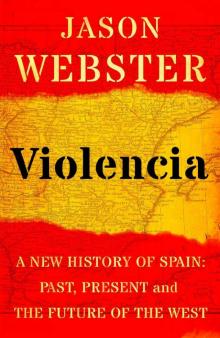 Violencia
Violencia Or the Bull Kills You
Or the Bull Kills You The Killing of El Niño Jesús
The Killing of El Niño Jesús The Spy with 29 Names
The Spy with 29 Names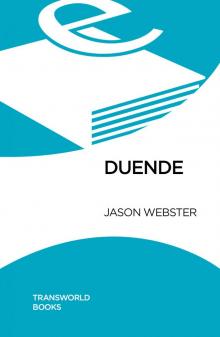 Duende
Duende Guerra
Guerra Sacred Sierra
Sacred Sierra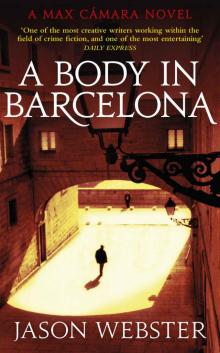 A Body in Barcelona: Max Cámara 5
A Body in Barcelona: Max Cámara 5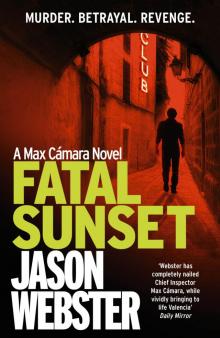 Fatal Sunset
Fatal Sunset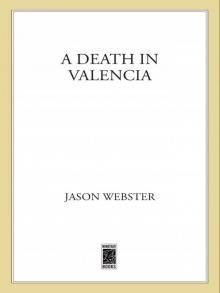 A Death in Valencia
A Death in Valencia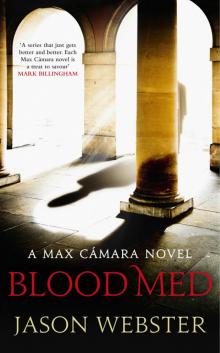 Blood Med
Blood Med Andalus
Andalus